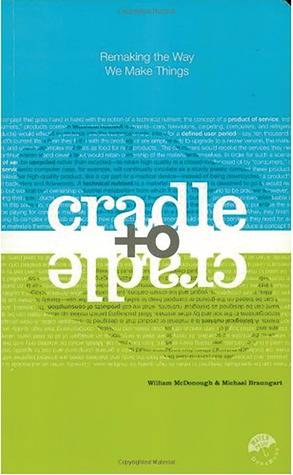

Cradle to Cradle: Remaking the Way We Make Things
by William McDonough and Michael Braungart
"Reduce, reuse, recycle," urge environmentalists; in other words, do more with less in order to minimize damage. But as architect William McDonough and chemist Michael Braungart point out in this provocative, visionary book, such an approach only perpetuates the one-way, "cradle to grave" manufacturing model, dating to the Industrial Revolution, that creates such fantastic amounts of waste and pollution in the first place. Why not challenge the belief that human industry must damage the natural world? In fact, why not take nature itself as our model for making things? A tree produces thousands of blossoms in order to create another tree, yet we consider its abundance not wasteful but safe, beautiful, and highly effective. Waste equals food. Guided by this principle, McDonough and Braungart explain how products can be designed from the outset so that, after their useful lives, they will provide nourishment for something new. They can be conceived as "biological nutrients" that will easily reenter the water or soil without depositing synthetic materials and toxins. Or they can be "technical nutrients" that will continually circulate as pure and valuable materials within closed-loop industrial cycles, rather than being "recycled" -- really, downcycled -- into low-grade materials and uses. Drawing on their experience in (re)designing everything from carpeting to corporate campuses, McDonough and Braungart make an exciting and viable case for putting eco-effectiveness into practice, and show how anyone involved with making anything can begin to do as well. William McDonough is an architect and the founding principal of William McDonough + Partners, Architecture and Community Design, based in Charlottesville, Virginia. From 1994 to 1999 he served as dean of the school of architecture at the University of Virginia. In 1999 Time magazine recognized him as a "Hero for the Planet," stating that "his utopianism is grounded in a unified philosophy that -- in demonstrable and practical ways -- is changing the design of the world." In 1996, he received the Presidential Award for Sustainable Development, the highest environmental honor given by the United States. Michael Braungart is a chemist and the founder of the Environmental Protection Encouragement Agency (EPEA) in Hamburg, Germany. Prior to starting EPEA, he was the director of the chemistry section for Greenpeace. Since 1984 he has been lecturing at universities, businesses, and institutions around the world on critical new concepts for ecological chemistry and materials flow management. Dr. Braungart is the recipient of numerous honors, awards, and fellowships from the Heinz Endowment, the W. Alton Jones Foundation, and other organizations. In 1995 the authors created McDonough Braungart Design Chemistry, a product and systems development firm assisting client companies in implementing their unique sustaining design protocol. Their clients include Ford Motor Company, Nike, Herman Miller, BASF, DesignTex, Pendleton, Volvo, and the city of Chicago.
Release Date:
April 21, 2002

